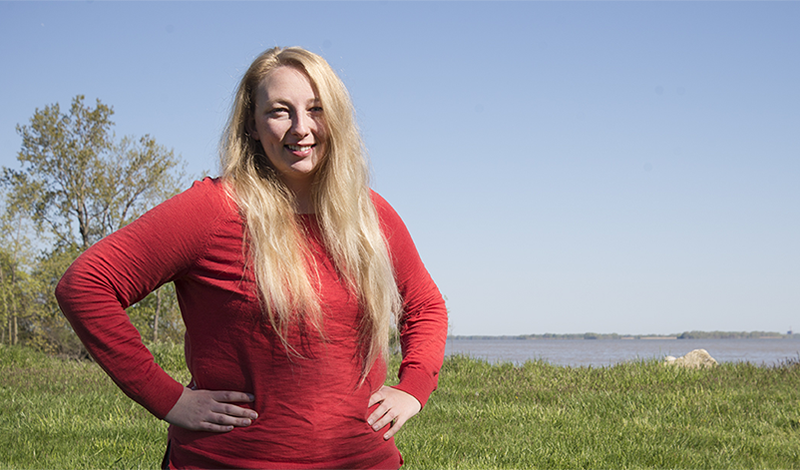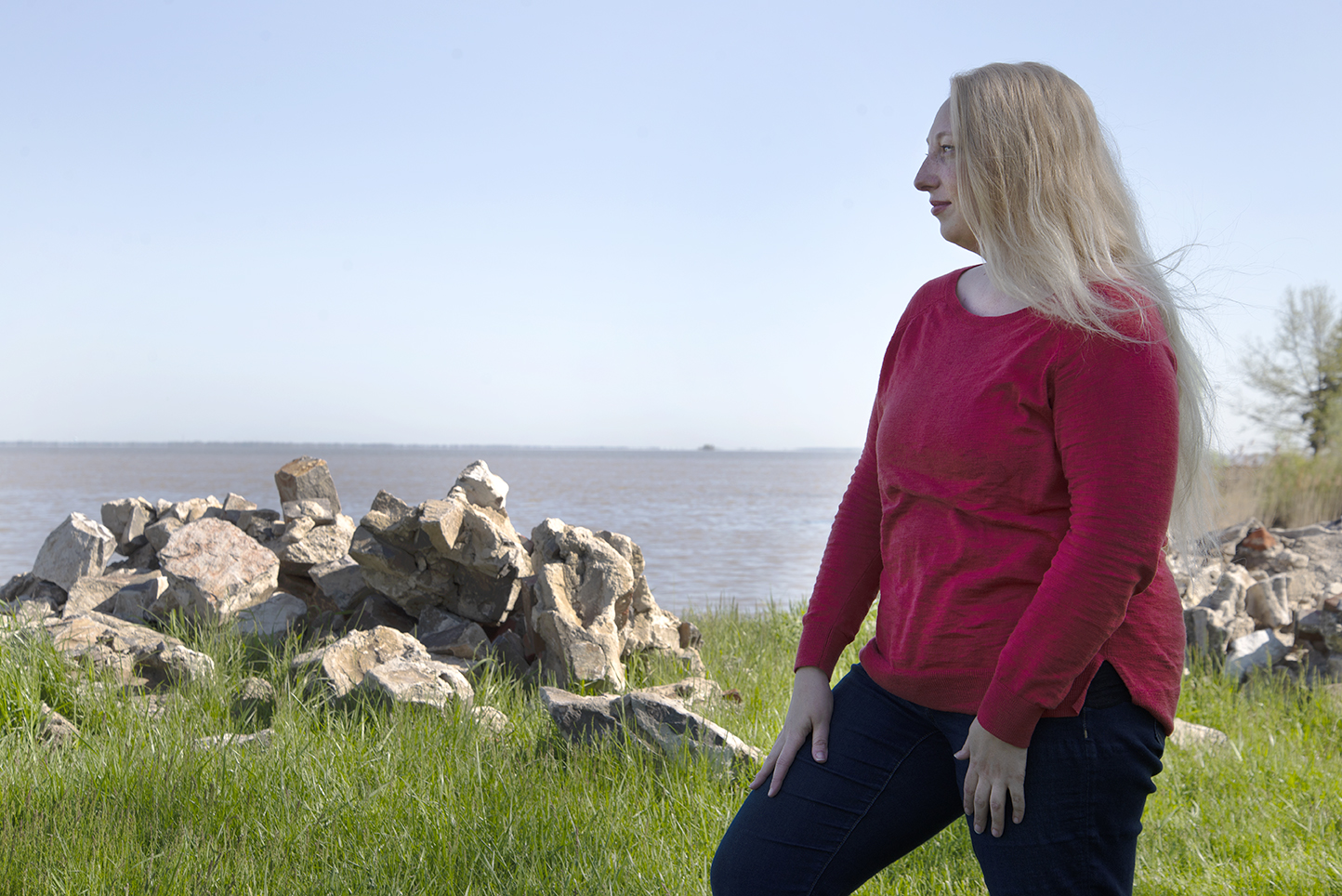Perseverance pays off
Alumna Markie Miller speaks at U.N. on behalf of Lake Erie cause
By Laurie B. Davis
On Earth Day 2019, alumna and environmental activist Markie Miller (A/L’12) spoke at the United Nations’ opening session of the Ninth Interactive Dialogue of the General Assembly on Harmony with Nature. The invitation to speak offered an international stage to talk about the Great Lake that she and her fellow Toledoans for Safe Water have committed to protecting.
| “It was daunting but empowering,” says Miller of the experience. “I thought, this is our moment to represent our cause.” That cause was the charter initiative to establish and recognize a Lake Erie Bill of Rights. The initiative was approved by 62% of Toledo voters in a special election held in February. The Lake Erie Bill of Rights fits into the rights of nature movement, which takes the view that nature has legal rights, thus, giving Lake Erie the right to exist, flourish and thrive. |
UToledo alumna Markie Miller (A/L ’12) addresses participants in the Ninth Interactive Dialogue of the General Assembly on Harmony with Nature at the United Nations in New York City.
|
The intent of the law is to protect the Lake Erie ecosystem from activities and projects that pollute and damage “natural water features, communities of organisms, soil, as well as terrestrial and aquatic sub-ecosystems that are part of Lake Erie and its watershed.”
The 2014 water crisis in Toledo and its surrounding region affected 500,000 people, says Miller. “It was not the most severe case we’ve ever seen in Lake Erie,” she says of the algal bloom that triggered the advisory to not use the water. “It made its way to the intake well, and suddenly it’s a public issue. We need to think about this beyond our tap water and our kitchen sink,” says Miller. “This ecosystem will not be able to handle bloom after bloom after bloom.”
Toledoans for Safe Water organized after the water crisis, and over the past five years it has faced legal obstacles to pushing its cause to the forefront of public opinion. Working with a lawyer from the Community Environmental Legal Defense Fund (CELDF), the group worked toward getting a charter amendment on a municipal, general election ballot.
Miller joined the group when she heard of its charter initiative because the goal resonated with her.
After earning her anthropology degree from UToledo, Miller studied at another university for a master’s degree in environmental science but was unhappy with that program. She says the curriculum focused on every problem the environment was facing. “It was very much like, let’s overwhelm you with every problem under the sun. We’re going to teach you everything that’s wrong, all of the bad stuff. I used to call it ‘the burden of knowledge’ because you knew too much. It was about what are you going to do as an individual, what are your consumer choices? Are you walking everywhere or are you driving?”

Once Miller joined the Toledoans for Safe Water, she also gave school another chance and enrolled in online courses in environmental science at the University of Idaho. She says both decisions reawakened her passion. “When I talked with the people working on the Lake Erie Bill of Rights and the woman from CELDF, it was like everything that was missing from my education. Even if this doesn’t work, it feels better than just being sad all the time about the world being in trouble.”
The protocol required for drafting a charter amendment and gathering signatures for the petition — as well as navigating the municipal and state legal systems — created a learning curve for Miller, who was new to politics and legal procedures. “Most people don’t know how to write up a charter amendment or even that they live in a chartered city. So that was a lot of new information for me.”
Education played a significant role in Miller’s choices and decisions regarding her environmental work. “My time at UToledo in the anthro department really shaped my interest in environmentalism,” says Miller, who took every class she could with Dr. Seamus Metress, professor of anthropology, including his 8 a.m. course on evolution.
Metress’ wife, Dr. Eileen Metress, professor emeritus of public health, became a strong influence on Miller after a talk at the public library on native plants. “It was all about making a huge difference for wildlife in your own backyard. I didn’t know about invasive species. I didn’t know about exotic plants. Something just turned in my head; the switch was on,” says Miller. Eileen Metress encouraged Miller to start a native plant garden on campus. “I got the anthro club to put in a garden in one of the courtyards at University Hall. We had 57 species of native plants. And within a year, we had hummingbirds, we had monarchs, and there were little chrysalises hanging off the bricks,” says Miller.
From that point on, Miller made environmental issues her business. “That cultivated my interest, and with the anthro background, I asked, what’s the role of people nurturing or harming nature? What’s their relationship with nature? It slowly evolved for me over time at UToledo.

The Toledoans for Safe Water members align their activism for Lake Erie with the rights of nature movement. Miller sees this movement as an expansion of rights. “For me, it’s about looking back through movements in time, which were met with severe criticism and opposition. So, you had the abolitionists and the suffragists and the civil rights movement. And you had all of these moments in time where you’re creating confrontations, but you’re doing so in a way that’s expanding people’s rights,” says Miller. “I see rights of nature in line with those, to say that in doing this, we’re not revoking the rights of individuals but expanding on the rights of a system that has sustained us for so long.”
In Miller’s opinion, the opportunity for citizens to speak up for their own rights connects with speaking up on behalf of nature. “If people take anything from the Lake Erie Bill of Rights, even if you’re not on board with rights of nature yet, you should at least be aware that this is also about upholding your democratic rights, your right to vote, your right to decide, and when you can’t say, ‘I don’t want this unsustainable practice to go on in my community,’ you really are voiceless.”






